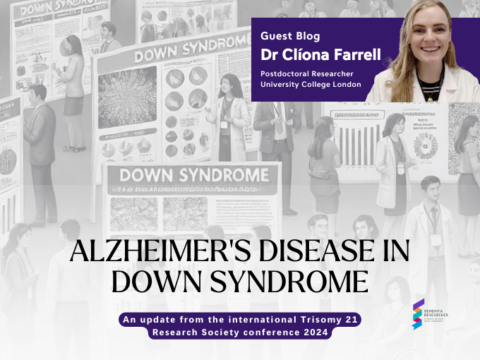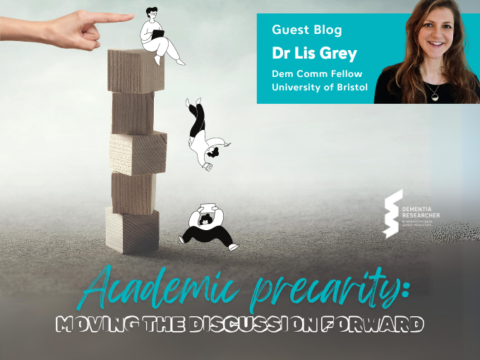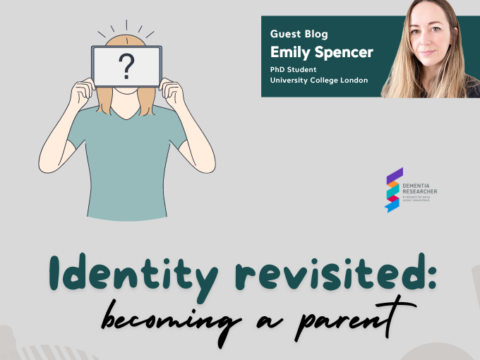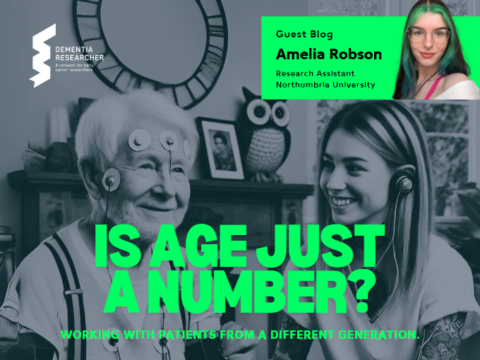Hello and thanks for checking out this blog. You’re reading/listening to the thoughts, feelings, and experiences of Nathan. This is the first of my monthly blog series on Dementia Researcher! This post is an attempt to introduce myself and hopefully provide some insight as to “who I am”, and “what I’m doing here”. In the post I will touch on my route into dementia and academia, some of the hurdles I jumped over along the way and I very briefly introduce my PhD topic – the Worcestershire Meeting Centres Support Programme. I’ve also managed to sneak a picture of some artwork in too.
What can you expect from my blogging? Well, I expect you will get a blend of my experiences doing research as I transition through my 1st year as a full-time PhD student, perhaps some content on my lived experience as a formal and informal dementia carer, as well as some ‘off the cuff’ stuff, that, be warned, may get a little political.
“Who are you?”
Always think this is a tricky question. Like when someone passes you and asks “are you ok?” Do they want the real answer, or do they want the quick and easy: “I’m good thanks, yourself?”. I find it hard to put ‘me’ down into a something short and succinct so I will give you my interview elevator pitch which I turn to when asked: “So tell us a little bit about yourself?”.
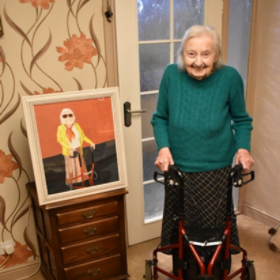
Nathan’s Gran
Well, I feel I have always shown a caring and compassionate side, from childhood to present day. But it wasn’t until my Grandad (Ted) got diagnosed with dementia in my late teens that I mobilised these values into something more tangible. I was benighted to the condition before Teds diagnosis, so much so I would render it epiphanic. I became alarmed at the lack of effort to prevent and alleviate symptoms, engrossed by the possibility to use my interest in sports to provide exercise programmes, and inspired to fulfil my nuanced purpose to improve people’s lives (noteworthy: at this point I had only visited one nursing home). Sufficed to say, I never did get my exercise idea off the ground, but it led me to academia – an indirect cause, but one with emergent effects (you can tell I have been reading evaluation literature).
But it wasn’t a straightforward process to get to where I am today. I didn’t have a good experience in education before University. I failed most of my GCSEs, scraped into college on a Level 1 Sports course which then qualifies you to progress onto level 2, 3 and then University (if you wish). Anyway, I just about passed level 1, but I was a challenging little lad, so they kicked me out of college and into the ‘real world’, what I like to call ‘the rat race’. I tried several different jobs and quickly became a slave to the clock, and, in the words of Richard Archer, I was “living for the weekend” which we should never do – life’s too short! I paid to retake my GCSEs and quite literally begged the college to take me back. Thankfully they did, and two degrees, one dodgy knee, and an array of jobs later, I have sort of ended up where I left off, in a roundabout kind of way – working on an intervention improving the lives of people affected by dementia.
“What are you doing?”
Nearly 6-months into my PhD and some things are beginning to make sense, others not. But a marked difference from the early weeks (now a little blurry), which in truth was a mix of utter jubilation and deflation – “I am ‘virtually’ here…”. Regardless of what your joining a team to do, it’s daunting, and in honesty, COVID has made it tough. Nevertheless, I am ‘here’, and I have begun the PhD journey. However, this isn’t the only journey. I am an informal caregiver for my Nan, Magaret (pictured right with her Christmas present from me) who is living with dementia. This is my second personal experience with dementia and it hasn’t got any easier.
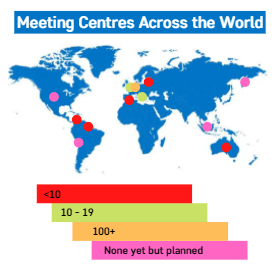
My professional and personal experience, that according to theory renders me an “expert by experience”, has helped contextualise the value of Meeting Centres, and understand (without actually attending one properly) why they are such a worthy cause. Meeting Centres are the topic of my PhD, specifically the Worcestershire Meeting Centres Community Support Programme. A bit of a mouthful I know.
Meetings Centres provide community-based social, emotional and practical support for people affected by dementia to adjust to the changes dementia brings, building on the work of Dementia Friendly Communities. Since development in the Netherlands in the early 90’s Meeting Centres have spread internationally (see map), notably through a pan-European project called MEETINGDEM, which successfully adapted and implemented the Meeting Centres model in the UK, Poland, and Italy. Since then, Worcestershire County Council, England, announced in January 2020 £540,000 to support the setting up and running of nine Meeting Centres across the County – the WMCCSP.
This novel countywide intervention has the opportunity to be a blueprint for nationwide dissemination of Meeting Centres, championing efforts to fill the inequitable gap that currently exists in post-diagnostic support. I have the job of researching this, as it develops, and hopefully in 3 years providing a thesis that demonstrates the impact and value of the countywide approach. Currently I have little more than a web browser with that many tabs open, I open a new browser each time as its overwhelming, and a desk full of scribbles that again amount to the same problem as the former. As a recent PhD graduate described to me, progress is glacial, but to be the individual heading this research is an absolute dream and I cannot wait to share the journey with you over the coming weeks, months and years.
Ta,
Nathan
Author
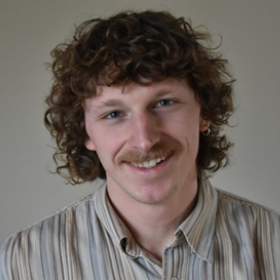
Nathan Stephens
Nathan Stephens is a PhD Student and unpaid carer, working on his PhD at University of Worcester, studying the Worcestershire Meeting Centres Community Support Programme. Inspired by caring for both grandparents and personal experience of dementia, Nathan has gone from a BSc in Sports & Physical Education, an MSc in Public Health, and now working on his PhD.

 Print This Post
Print This Post